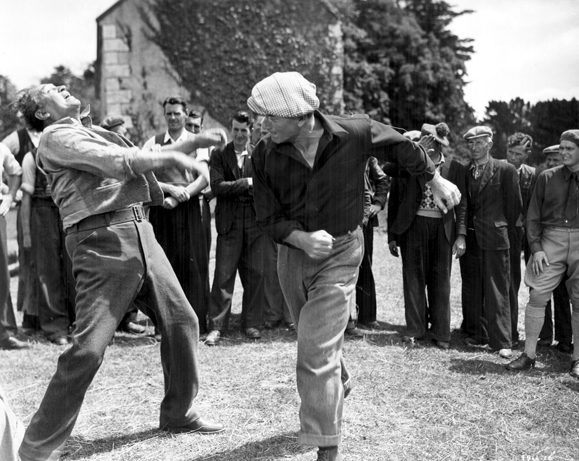As Clint Eastwood receives the first John Ford Award, IA takes a brief look at the Ford’s legacy.
John Ford garnered many superlatives to describe his lifetime of works. In a career that spanned 57 years, he directed 136 films and received a total of 26 Oscar nominations. To this day, he holds the record for winning the most Oscars for Best Director. His How Green Was My Valley won a staggering five Oscars. He was also the first filmmaker to receive the Medal of Freedom, which President Richard Nixon presented him with on March 31, 1973, at the first AFI Lifetime Achievement Ceremony.
The Quiet Man, one of his many iconic movies, explored the desire to return to Ireland and attempt to fit in with an insular society. It made a huge star of Maureen O’Hara and further cemented John Wayne’s stature. It also put Ireland on the map as a film making destination.
In an interview with Irish America in 2004, O’Hara, who worked with Ford on five movies, said, “He was a genius. He was the finest director any of us ever worked with, and we were proud to work with him and work for him. We realized that he was bad-tempered and awful but we accepted it and forgave him. . . . He was abusive if it suited him and what he was after. I used to watch him and think, ‘Oh, he’s after something.’ … He hated my character or he loved my character. When he did a script he totally immersed himself in both the female and male characters and they would inhabit his dreams.”
Ford was born John Martin Feeney in Cape Elizabeth, Maine on February 1, 1894. His father, John Augustine Feeney, was born in Spiddal, an Irish-speaking area in Co. Galway. His mother, Barbara Curran, was born on the Aran Island of Inis Mor. O’Hara also said of Ford, “He wanted to be born in Ireland. He wanted to be a military hero in Ireland’s problems.”
The Informer, based on Liam O’Flaherty novel about the IRA, won Ford his first Oscar and the movie took home a total of four that year, including Best Screenplay, Best Actor and Best Score. Mother Machree is notable as the first Ford film to feature John Wayne. It was also one of the first “talkies” made by Fox Studios. He adapted Sean O’Casey’s The Plough and the Stars for the screen, using the Abbey Players, and he also directed a biopic on the life of O’Casey in Young Cassidy.
The Grapes of Wrath remains a cinematic classic and was one of the first 25 films to be selected for preservation in the National Film Registry by the Library of Congress as being “culturally, historically and aesthetically significant.” The Searchers was named The Greatest Western of All Time by the American Film Institute in 2008.
Ford was considered one of the prime influences on the radical French New Wave movement in the 1950’s and 1960’s. His influence on other masters of the cinema has been well documented. Ingmar Bergman said simply that “Ford is the best director in the world.” Orson Welles, who said he watched Stagecoach over forty times in preparation for making Citizen Kane, put it this way: “I like the old masters, by which I mean John Ford, John Ford and John Ford.” Fellini put it thus: “Ford – I esteem him, I admire him and I love him.”
Modern filmmakers like Martin Scorsese, Steven Spielberg and George Lucas have all acknowledged a debt to Ford’s influence.
Ever the filmmaker, Ford made two documentaries for the Navy Department in World War II, even though he was wounded at the time. Both The Battle of Midway and 7th December won Oscars.
The John Ford Ireland Symposium in Dublin in June will feature screenings of many Ford classics, as well as exhibitions of photos, posters, memorabilia and scripts. There will also be master classes, lectures and a John Ford Film Trail featuring some of the Irish locations he used in his movies, such as Ashford Castle, the Aran Islands, Dublin and Wicklow. Next year (2013), an international competition and scholarship will be offered to eight young aspiring international film makers to have their work screened as part of the symposium.


Leave a Reply